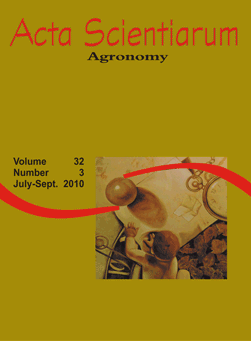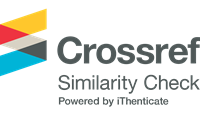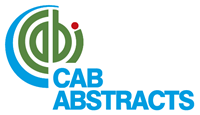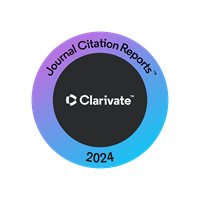<b>Delayed cooling on the quality of <em>Maciel</em> peaches</b> - doi: 10.4025/actasciagron.v32i3.3947
Keywords:
stone fruits, chilling injuries, ripeness stage
Abstract
Delayed cooling (conditioning) was evaluated for effectiveness in avoiding chilling injuries of Macielpeaches harvested at two ripeness stages, mature-green or tree-ripe, and immediately thereafter placed in cold rooms at 0°C (controls) or maintained for 2 days (tree-ripe) or 3 days (mature-green) at 20°C before transfer to cold storage at 0°C. After 7, 14, 21 or 28 days, samples were retrieved from storage and kept for 3 more days to complete ripening at 20°C. Delayed cooling mature-green (DCMG) peaches had higher weight losses compared to control mature-green fruit at retrieval from storage and more reduced fresh weight losses after ripening. Peaches harvested at the tree-ripe stage did not differ significantly in weight loss. DCMG peaches were less firm than control mature-green peaches after retrieval from storage. Delayed cooling tree-ripe fruits (CTR) were firmer than controls. No woolliness symptoms were observed in any of the treatments. Flesh browning was determined in all conditioned peaches after 21 or 28 days at 0°C. Leatheriness was observed in all the peaches transferred to air after 21 or 28 days at 0°C. Conditioning of Maciel peaches is not an efficient postharvest procedure to avoid chilling injuries and, therefore, should not be recommended for this cultivar.Downloads
Download data is not yet available.
Published
2010-08-25
How to Cite
Seibert, E., Leão, M. L. de, Rieth, S., & Bender, R. J. (2010). <b>Delayed cooling on the quality of <em>Maciel</em> peaches</b> - doi: 10.4025/actasciagron.v32i3.3947. Acta Scientiarum. Agronomy, 32(3), 477-483. https://doi.org/10.4025/actasciagron.v32i3.3947
Issue
Section
Crop Production
DECLARATION OF ORIGINALITY AND COPYRIGHTS
I Declare that current article is original and has not been submitted for publication, in part or in whole, to any other national or international journal.
The copyrights belong exclusively to the authors. Published content is licensed under Creative Commons Attribution 4.0 (CC BY 4.0) guidelines, which allows sharing (copy and distribution of the material in any medium or format) and adaptation (remix, transform, and build upon the material) for any purpose, even commercially, under the terms of attribution.
2.0
2019CiteScore
60th percentile
Powered by 

2.0
2019CiteScore
60th percentile
Powered by 




















































